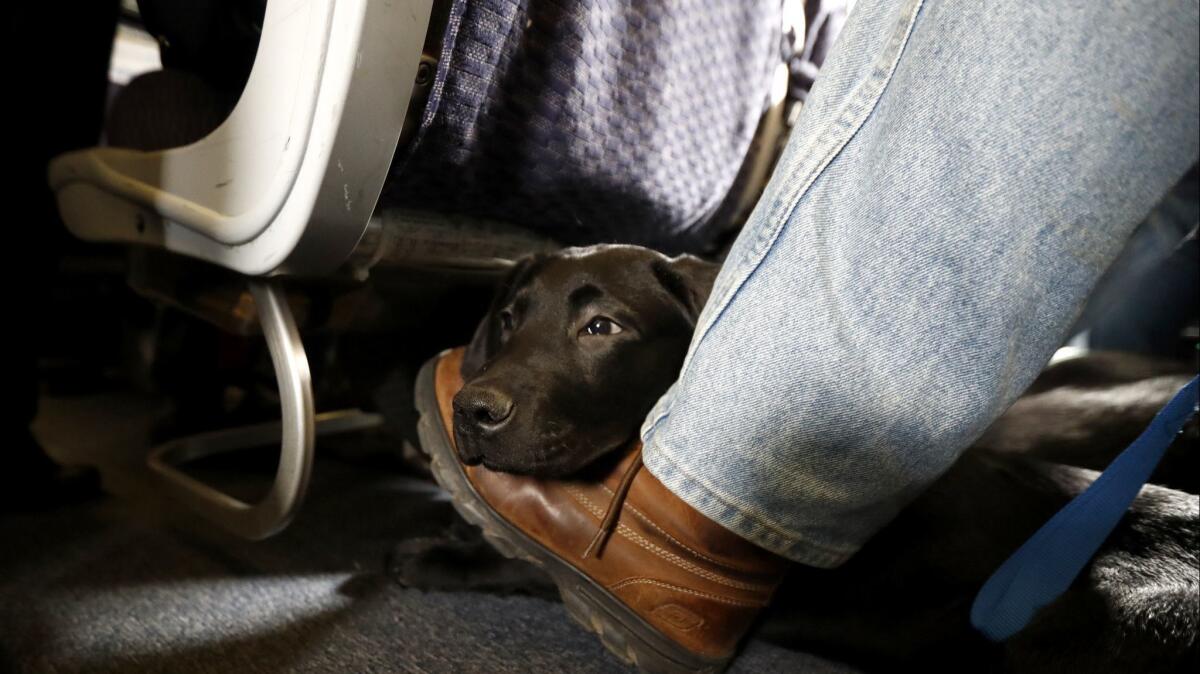Kick them off. No, keep them. How readers would deal with the issue of emotional support animals in flight

- Share via
No dogfight broke out after the March 25 “On The Spot” column (“Fur Will Fly in This Debate”), which raised the fraught issue of emotional support animals flying in airline cabins. There was a little growling and some snappishness, but scores of readers who responded not only helped frame the discussion but also came up with suggestions on how to address the issue.
First, their thoughts on emotional support animals, or ESAs, which are not the same as service animals that have been trained and are not pets.
Some names have been withheld for privacy because of medical issues.
It’s cheating and it’s outrageous
Helene Kimmel of Porter Ranch knows people who disguised their animals as ESAs to avoid paying a pet sitter or a fee to fly their furry friend.
“I believe that true service animals must be allowed to accompany their owners on planes, trains and subways,” Kimmel wrote, “but I am outraged at the deceit of some animal owners.”
It’s a disservice to your pet
Michael Carson of Palm Springs loves his pets but, he wrote, “We just would not dream of dragging them on a plane…
“Your Maltese Fifi may be as cute as a button, but stop ripping off the airlines, stressing the dog and annoying the rest of us. Leave her at home.”
Consider those with allergies
“My husband has severe asthma and allergies,” Becky Davis of Goleta wrote.
“Just as airlines no longer serve peanuts in deference to those with severe peanut allergies, I hope they will severely restrict all but service animals from sharing cabin space” out of consideration.
Give peace a chance
Anne K. Marcum of Hesperus, Colo., said, “I believe that someone’s right to carry their precious Fifi on the plane should end where my rights begin: the right to peaceful travel!”
Airlines aren’t omniscient, either
How does an airline anticipate allergic reactions to a variety of animals and prepare for their varying degrees of cleanliness, Laura Veltman of Eastvale, Calif., asked.
“Do I have a peacock allergy?” she wrote. “Did a support turtle leave traces of salmonella on my armrest? Are those blueberries on the floor or a gift from my seatmate’s support bunny?”
Animals aren’t always angels
Some animals cause problems for those who have legitimate service animals. Piper Belanger of Acton recounted this story of a journey with her husband, Larry McMahan:
“My husband, who is paralyzed on his right side, his service dog and I took a flight from LAX to North Carolina. A couple with a cocker spaniel on a retractable leash approached us before boarding, and their dog barked like crazy and tried to get close to our service dog, Abby.
“As we always do, I gave our Abby a mild sedative….though she is quite friendly and well trained.
“When the couple with the cocker spaniel came down the aisle, their dog lunged at Abby….The couple did nothing, but my husband instinctively lowered his one working hand to protect Abby and the cocker spaniel bit his hand….
“The couple still said nothing and progressed down the aisle to their seats. We were given paper napkins to stop the bleeding; it took several.”
They got no satisfaction from the airline’s customer service department: “We were told this injury was not the fault of [the airline]…. And we have had no correspondence from the couple.”
Other airlines should follow the leads of United and Delta, which recently began requiring more documentation, Belanger wrote. She also would like a ban on retractable leashes and thinks an animal should be carried, not walked, down an aisle, if that’s possible
Another reader who travels with a service animal because of physical and emotional issues is afraid to fly because of badly behaved emotional support animals: “How do I know if someone’s pet is not going to try and attack my working dog?”
Those are among the scores of opinions and concerns, but many readers also understand that legitimate emotional support animals can play an important role in helping travelers.
There are no easy solutions, but readers had some good ideas about starting points.
Quit making it easy
“You shouldn’t be able to purchase a vest for a service animal everywhere,” Sheila Johnson of Lawrenceburg, Ky., wrote. “Should be just one, maybe two places that handle them or order them from the trainers of service animals.”
A vest doesn’t mean anything except that someone had the money to buy one. “Just yesterday, a little dog snarled at me, and it was wearing one of those little vests,” Patti Jo Kiraly of Laguna Beach said.
Require training and documentation
“I adopted my dog from the local shelter two years ago, and we have taken a number of obedience courses,” one writer said of her emotional support animal. “His behavior is not perfect, but he [will] sit, stay and bed down.
“My preferred airline requires a current doctor’s letter and vet’s health certificate, which I have. These should be minimum requirements for responsible ESA owners and their animals.”
Airlines must crack down
More regulation isn’t the answer, said retired pilot Roger Cox of Annapolis, Md. “Do we need more rules? Not if airlines get stricter and people stop taking advantage of weak enforcement of the existing rules,” he wrote.
“Book your flight with the airline that has the strictest rules about animals.”
Make room
“All pets on airlines should be in crates,” said Susan Werner of Los Angeles. “Airlines should have a certain number of crates that have replaced [some] seats and the [owner’s seat] should be right next to the crate so the passenger can sit right next to their pet in case it really is, indeed, a service animal.”
Apply the rules evenly,
and make people pay
“One of the airlines’ biggest problems has always been consistent rule application,” said Rich Mathus, a former airline gate agent who lives in Dr. Phillips, Fla. “In the short term, airlines need to state that they do not recognize ESA cards.
“Then the government needs to step in and review both the Americans With [Disabilities] Act and the Air Carrier Access Act to determine how/whether emotional support animals need to be addressed and harmonize the statutes to eliminate the gray area that has created the growing fraud.”
And he made this point: “The high prices charged for pets in the cabin and unaccompanied minors are designed to be a disincentive.”
One reader said she would pay to have her emotional support animal with her: “Would I fly without him by my side? No. Having him with me and available to touch or pet greatly relieves my PTSD [post-traumatic stress disorder] and anxiety.”
But if your animal is just a pet along for the free ride? Susan Werner gets the last word on this: Taking your pet is a “luxury just like traveling on an airplane is.”
Have a travel question or dilemma? Write to travel@latimes.com. We regret we cannot answer every inquiry.
More to Read
Sign up for The Wild
We’ll help you find the best places to hike, bike and run, as well as the perfect silent spots for meditation and yoga.
You may occasionally receive promotional content from the Los Angeles Times.







